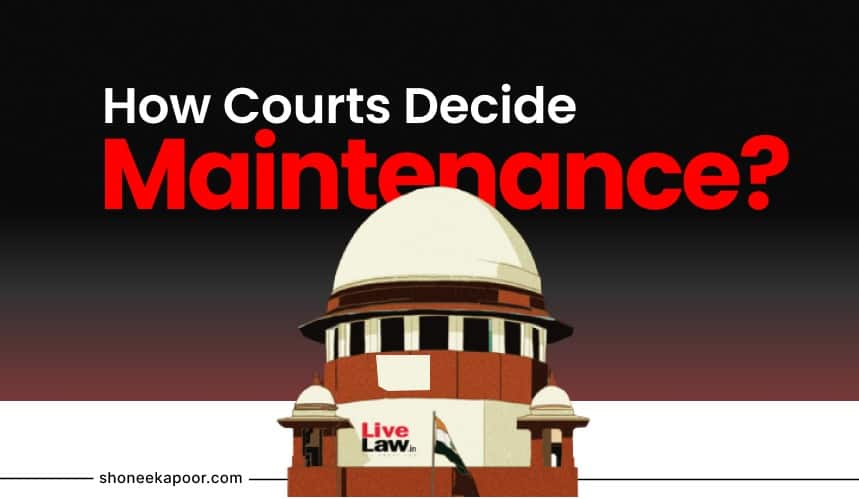How Courts Decide Maintenance
Over and over again, whenever there is a dispute in the marriage, one question arises. How much maintenance has to be given to the wife?
The question also takes many shapes, from
- I earn X amount, how much maintenance
- I have n children, how much maintenance
- She file for divorce, so why should I pay maintenance
- She left on her own, so why should I pay maintenance
- She is so and so pass, how much maintenance
- She is adulterous, how much maintenance
- Her father is so and so, how much maintenance
- If I quit my job, do I have to pay maintenance
- So and so court said, 1/3rd of husband salary as maintenance
- So and so court said, 1/4th salary of husband shall be given as maintenance
- How does Percentage of part be decided when there are children and other dependents involved.
As we can see, there are varied circumstances, so how do courts decide maintenance in diverse cases?
Delhi High Court, in most cases, has held steadfast to the Mathematical formula of apportionment. In diverse cases, it has been held that the husband’s income be apportioned in the parts equivalent to his dependents plus one. Each dependent should be given one part, and two parts be kept with the husband as he is the earner. So, based on this aspect, 1/3rd of the husband’s salary can be given to the wife if there is no child involved and the husband has no dependents. Also, if there is one child and no other dependent, the wife and child would be entitled to ½ of his salary. This goes on and can be the most straightforward formula for deciding maintenance. Similarly, if the wife is earning, then the same formula can be used to apportion the income of both parties.
However, things are only sometimes so. The income of the parties is not always available in black and white. In such cases, how do courts conclude maintenance? The courts consider the following aspects.
CAPACITY: There is a presumption that every non-disabled person must earn and maintain their wife and children. Unfortunately, the same presumption is not accounted for by courts for women in India. The courts don’t hold a presumption that every non-disabled woman should also earn. One may argue that the husband, though non-disabled, had always been unemployed. The courts have considered this question and presumed that if such a person is married and takes a wife, it is assumed that the family had sufficient means to support him and his wife. The income based on lifestyle, etc, is provided in such circumstances. The courts thus consider the actual capacity and make presumptions about the husband’s capacity.
INCOME OF PARTIES: Here, we discuss the parties’ income. The actual net take-home income of the parties. However, courts are mindful of certain deductions that parties cannot control. Contributions to the Provident Fund and other direct taxes, like professional taxes, income taxes, etc., are deducted, as parties have no control over them. The courts are also somewhat liberal in considering deductions of pre-existing liabilities like home loans, marriage loans, and premiums towards life insurance policies. However, courts must check how long these liabilities were taken. The courts believe that one party can not create assets while making the other party destitute. In this case, the same formula is applied to the applicant’s income. Courts often have accounted for amounts deposited in the wife’s account regularly as income. Both Delhi High Court and Punjab & Haryana High Court thus ask for an exhaustive list of income, asset and liabilities affidavits of parties to decide maintenance.
NEED OF PARTIES: There was a time when it was assumed that the maintenance was only to prevent vagrancy and destitution. However, the same does not hold good anymore. Courts have concluded over and over that the wife shall get sufficient maintenance to maintain herself and live in the same comfort as she was living in her matrimonial home. Again, the affidavit mandated by Delhi and Punjab & Haryana High Court comes into play. If parties have genuine medical needs, the genuine need of some employees in running their business and money, the same is also accounted for by courts.
CONDUCT: This seems bizarre to many men who come to weekly meetings when I say it is one of the deciding factors. Then how can the court not consider adultery, cruelty, promiscuity, desertion and other aspects like she is the erring party, she is this and that while deciding maintenance? The reason is that parties’ conduct is primarily visible to courts only after leading evidence. The courts cannot look into these aspects at the interim stage or under Section 24 of the Hindu Marriage Act. The courts are mainly concerned about the above elements, which I mentioned. This said judges are also human beings, and the parties’ conduct impacts the quantum of maintenance. It also has implications from which date maintenance is granted. If the wife is found to be deliberately delaying the decision on interim maintenance, the same is taken into account. Also, if women are caught prima facie lying on affidavits, the same has impacted the quantum of maintenance.
EDUCATION & PREVIOUS WORK EXPERIENCE OF WIFE: For a considerable time, courts were dismissing maintenance to highly educated wives with prior work experience. However, in late 2018, the Supreme Court concluded that the wife’s capacity rather than capability should be considered while deciding maintenance. This said, only some things are lost on this ground. I have often advised people to argue on the same, and some have successfully limited the maintenance to a specific time limit, like a year or two. In those cases, the courts advised the girls to find work in between. This has only worked sometimes but has certainly benefitted some.



Leave A Comment